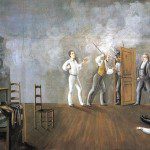Recently, I finished John G. Turner’s excellent Brigham Young: Pioneer Prophet. It is an eminently fair-minded biography that should prove to be the definitive account of Young’s life. Personally, I came away from the biography with far greater insight into Young’s spirituality and his theological contributions to Mormonism—one of the many wonderful pay-offs for reading Turner’s 400-page tome. I also came away from the biography with a previously held picture of Young confirmed: he was a harsh individual prone to violent hyperbole directed at his friends, as well as his enemies. And, at the height of a nearly apocalyptic conflict with the federal government in the 1850s, he condoned real violence (murder)—at least after the fact—against real people. [1]
This portrait of Young neither surprised me nor did it trouble my religious moorings. I’m a member of Community of Christ (formerly called the RLDS church), and we’ve historically not been especially fond of Brother Brigham, a figure that my ancestors (unfairly) blamed for just about everything that we felt went wrong with early Mormonism (theocracy, polygamy, militarism, racism, etc.). I was already prepared to believe that Young was a complicated, problematic individual in Mormonism’s history. For that reason, I greatly appreciated how Turner helped me understand Young’s endearing qualities to his nineteenth-century followers.
However, as I began to read online reviews of Turner’s book by LDS members, I became aware of how deeply troubling his balanced, realistic portrait of Young has been for many LDS readers. It has even been troubling to a few post-LDS readers. This surprised me a bit. Consequently, I drafted an earlier version of this column in which I tried to empathetically imagine how one could embrace Brother Brigham without creating moral justification for the real violence he aided and abetted. Fortunately for any readers of this column, I decided to scrap that rather large and unwieldy project. Instead, I want to briefly address one small way that readers of Turner’s biography might deal with the dissonance created by learning more of the historical Brigham.
To put it a bit glibly, LDS readers who struggle with Turner’s biography should read more fiction. Seriously. By this, I do not mean that LDS readers should substitute a volume from Gerald Lund’s The Work and the Glory for Turner’s Brigham Young. I mean that individuals should read stories where, in the space of a fictional narrative, characters confront multifaceted problems, wrestle with less than pure motives, act in ways that are not always moral, and experience a world that is not always just. Read Graham Greene, Marilynne Robinson, and Cormac McCarthy. For that matter, read almost any short story or novel once assigned in high school or a first-year college lit class.
Why? Well, one recent psychological study showed that after a sample group read a short story, rather than an empirically-based article, they could more easily embrace ambiguity when they encountered it without jumping to snap judgments. The study’s authors argue that “while reading, the reader can stimulate the thinking styles even of people he or she might personally dislike. One can think along and even feel along with Humbert Humbert in Lolita, no matter how offensive one finds this character. This double release—of thinking through events without concerns for urgency and permanence, and thinking in ways that are different than one’s own—may produce effects of opening the mind.” [2] And by “opening the mind,” the authors meant thinking in novel, creative ways and being much more open to ambiguity rather than seeking “cognitive closure.” Maintaining one’s comfort with a measure of ambiguity, I would argue, is a necessary skill to master when one engages with serious scholarship about the past. It certainly would help when one encounters the historical Brigham in Turner’s raw and empathetic portrait. And, it could help LDS members keep Brother Brigham—the figure with whom they have a religious relationship—as a relative, even if he should not be a close, trusted friend.
[1] John Turner, Brigham Young: Pioneer Prophet (Cambridge: Harvard University Press, 2013), 122, 186-188, 258-259, 349-350.
[2] Tom Jacobs, “Study: Reading Novels Makes Us Better Thinkers,” Salon, 15 June 2013, http://www.salon.com/2013/06/15/book_nerds_make_better_decisions_partner/











